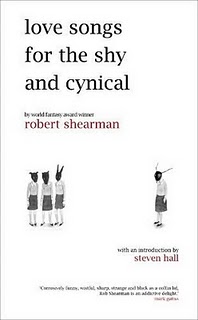 Title: Love Songs for the Shy and Cynical
Title: Love Songs for the Shy and Cynical
Author: Rob Shearman
Pub: Big Finish, 2009
Genre: Short Stories/ Novellas
Awards Won: Shirley Jackson Awards, Edge Hill Short Story Readers Prize, 2010 British Fantasy Awards
The first thing you should know about this book is that it’s exactly what a short story collection should be– rather like expensive chocolate truffles. The best way to enjoy is to slowly nibble just one at a time, savoring the flavors and the artistry. Then, put the book down. Wander off, cook, feed the cat, mail the letters, or do the laundry. As you do, the memory of the story, the ethereal taste, will ghost just along with you. Then, sometime later… an hour, a day, just as the flavor fades… you’ll come back and taste another– different from the first and yet just as exquisite.
The second thing you should know about this book is that it’s apparently impossible to review it without resorting to lyricism.
Shearman’s narrative style is deceptively straight-forward. No flowery flights of language. He creates a world in just a few deft strokes, that we completely recognize as our own–
–just to pick one, the opening of ‘Your Long, Loving Arms’ introduces us to Steve: “In the end, it was the afternoons that were killing him. The evenings were fine. The evenings, he could cope with. He wasn’t working in the evenings, it was true, but that was okay, lots of people didn’t work in the evenings. He’d play with Ben a bit, like a normal dad, might read him a bedtime story if Ben fancied it. Like a normal dad, and in a normal family too, he’d cuddle up with Cheryl on the sofa and they’d watch a spot of telly, and at last Cheryl would say that she’d best go to bed, she had to be up early in the morning. And he’d go with her, though he didn’t have to be up early, not any more” (87). Simple enough, right? and heart-breakingly recognizable in these days of unemployment and redundancy–
— then Shearman slips our world just a little bit sideways with a word, but ever so gently that it seems the only natural way to be. So, our Steve, in an attempt to stem the tide of those lengthening afternoons, enlists in the Tree Scheme: “It was funny– after an hour or so you didn’t feel the stiffness in your arms. First they numbed, then felt like something detached from the body altogether. And when the breeze fluttered his leaves, Steve thrilled to it– the wind just teasing them, they didn’t seem so much blown about as stroked” (92). You need to read it now, don’t you?
Hence why, though his stories are often nominated for Fantasy and Horror awards, they’re not really either, in the traditional sense– but in the sense that we are amazed and terrified by ourselves, reflected back in one of those mirrors where it’s just twisted enough that you recognize a stranger’s face in your own. Plus, what the labels tend to set aside is the humor woven deftly into the fabric of these stories. Not the burst into laugher in public kind– though you might, as I did, get asked what you’re grinning about, which you will find yourself utterly unable to describe– but that kind of communal recognition that life is a funny old thing, after all, but it’s ours.
Sitting here, writing this and flipping through the book to find my favorite to tell you about, I keep finding one favorite and then another and then another, but all for different reasons. Each story’s narrator is unique and both exactly like someone you know and completely unlike anyone else at all–some through the delicacy of third person [including “Love Among the Lobelias,” “Roadkill,” and “Love in a Time of Sharing”] and some through the intimacy of first [including “Not About Love,” “Be of Good Cheer,” “14.2,” and “At the Crease”]. Tenderness, shyness, loss, loneliness, hope, cynicism, yes, and longing too– the stories are about love, after all. And, along the way, perhaps just a tinge of that fear of love gone a bit (well more than a bit really, a very very lot) wrong, there’s “George Clooney’s Mustache.”
The third thing you should know about this book is that picking a favorite story is too hard.
Go on then. Here you are: http://www.bigfinish.com/ranges/love-songs-for-the-shy-and-cynical
 Title: Birth Marks
Title: Birth Marks

 Title: The Shortest Way to Hades
Title: The Shortest Way to Hades Title: 84, Charing Cross Road
Title: 84, Charing Cross Road
 We ain’t afraid of no seminal Modernist text!
We ain’t afraid of no seminal Modernist text!
 How do you keep your place while reading a book? Bookmark? Dog-ears? Laying the book flat open?
How do you keep your place while reading a book? Bookmark? Dog-ears? Laying the book flat open?
